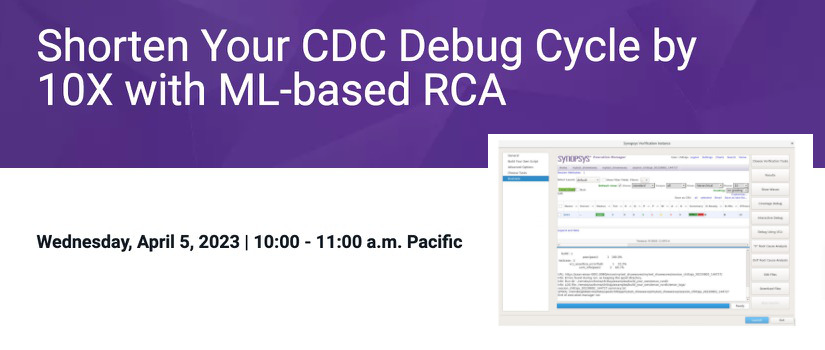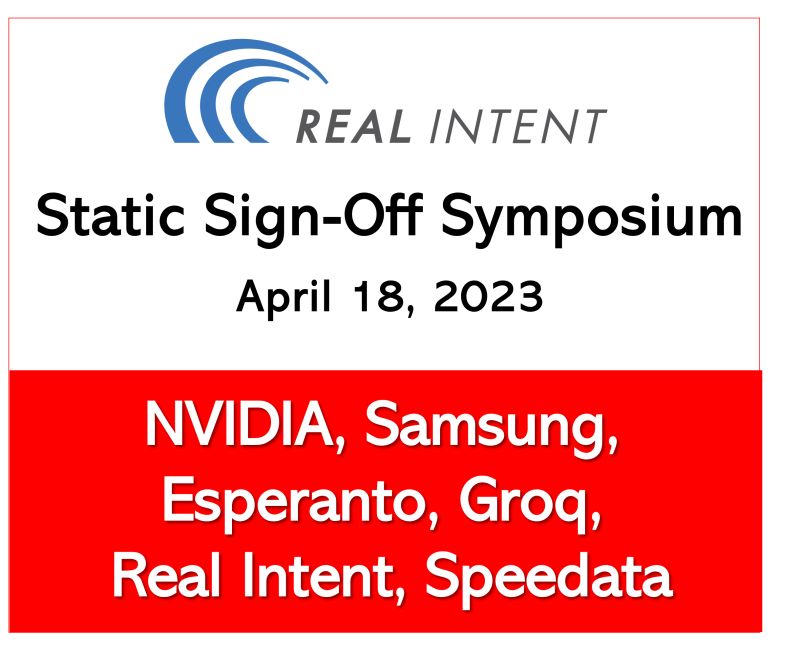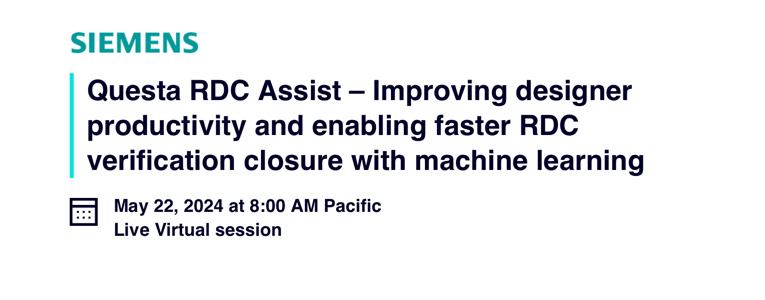CDC
Events
-
-

Pre-empt Late-stage Low Power Issues using Predictive Analysis
Low power is an increasingly critical requirement for all modern SoCs. Moreover, it is becoming more and more difficult with complex architectures being used in modern designs. This has made it necessary for designers to invest heavily in this verification effort throughout the design development cycle starting from architecture definition, RTL development, to final netlist tape-out. Conventionally, static low power flow constitutes defining and cleaning… Pre-empt Late-stage Low Power Issues using Predictive Analysis
-
-

Running CDC Analysis with Xilinx Parameterized Macros
Designing FPGAs that use a single clock domain is a luxury that very few of us have. Modern FPGA designs must cope with multiple clocks running at different frequencies, very often asynchronous to each other, and still be expected to work reliably. Xilinx Parameterized Macros (XPM) can be used to implement CDC, FIFO and BRAM… Running CDC Analysis with Xilinx Parameterized Macros
-
-

Constraints-Driven CDC and RDC Verification Including UPF Aware Analysis
Today’s million gates integrated circuits (ICs) involve various intellectual properties (IPs) interfacing with each other through multiple asynchronous clock and reset domains. Ensuring all clocks propagate concurrently across each clock tree components used as clock switching elements or each sequential or combinatorial component, clock output of which becomes asynchronous with respect to the clock input… Constraints-Driven CDC and RDC Verification Including UPF Aware Analysis
-
-

CDC Verification with Hard IP Blocks
Most FPGA designs contain configurable hard IP blocks supplied by FPGA vendors. These Hard IP blocks do not contain synthesizable RTL code, and therefore are excluded from advanced linting. In fact, this is a correct approach as hard IP blocks are assumed to be functionally stable and may be excluded from both static and dynamic… CDC Verification with Hard IP Blocks
-
-

Shorten Your CDC Debug Cycle by 10X with ML-based RCA
Over the last few decades System on Chip (SoC) design size has dramatically increased, and more complexity has been introduced to deliver the desired functionality. Growing design sizes lead to the introduction of several asynchronous clocks which can result in the reporting of millions of clock domain crossings (CDC) at the IP/SoC level. This leads… Shorten Your CDC Debug Cycle by 10X with ML-based RCA
-

Static Sign-Off Symposium 2023
DoubleTree Hotel 2050 Gateway Place, San Jose, CA, United StatesAdvanced Static Sign-Off Methodologies Leading SoC designers will share their advanced static sign-off methodologies and best practices to support first-silicon design goals, along with results achieved in accelerating early functional verification and sign-off of digital designs. Topics will include: AI/ML, targeted sign-off, incremental sign-off, multimode, hierarchical, dynamic CDC, and more. Advanced Static Sign-Off Methodology Presenters:… Static Sign-Off Symposium 2023
-
-

Comprehensive Static Verification for FPGA and ASIC RTL Designers
As designs get increasingly complex, design teams are looking to find bugs earlier, to reduce rework and shorten time-to-market. The ultimate “shift left” is to put easy-to-use static verification in the hands of RTL designers to eliminate bugs at their source. This webinar covers comprehensive static verification capabilities in the Cadence® Jasper™ Superlint and CDC apps for… Comprehensive Static Verification for FPGA and ASIC RTL Designers
-
-

Avoiding Metastability in Hardware Software Interface (HSI) using CDC Techniques
Various IP blocks within an SoC are often required to work in different clock domains in order to satisfy the power constraints. Clock domain crossing (CDC) challenges faced by design engineers include: - Speed and power requirements lead to designs with multiple asynchronous clock domains on different I/O interfaces and data being transferred from one… Avoiding Metastability in Hardware Software Interface (HSI) using CDC Techniques
-
-

Questa RDC Assist – Improving designer productivity and enabling faster RDC verification closure with machine learning
In 2021 Siemens EDA released CDC Assist. CDC Assist is an ML powered feature that empowers users to configure, debug, and close CDC on designs more rapidly. Following the success of CDC Assist, Siemens introduced RDC Assist in 2023. Using the same ML technology in CDC Assist, RDC Assist dramatically improves the time and… Questa RDC Assist – Improving designer productivity and enabling faster RDC verification closure with machine learning
-
-

Static and Dynamic CDC Verification of AXI4 Stream-based IPs
The AXI4 Stream protocol is used as a standard interface to exchange data between connected IPs within FPGA designs. For crossing clock domains, the AXI4 Stream interconnect is based on switches capable of transferring data to another asynchronous clock domain. The alternative solution is a dual-port AXI4 Stream IP, capable of changing clock domains when… Static and Dynamic CDC Verification of AXI4 Stream-based IPs